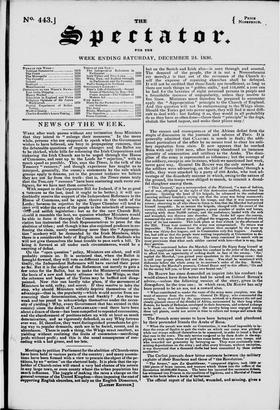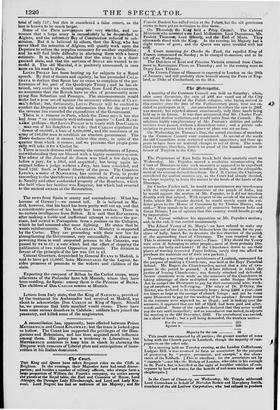The causes and consequences of the African defeat form the
staple of discussion in the journals and saloons of Paris. It is generally admitted that CLAUSAL is much in fault; the addi- tional particulars of the affair by no means tend to clear his mili- tary reputation from stain. It now appears that he reached Bona with only 1200 men, after having abandoned an immense quantity of ammunition and artillery to the Arabs. The disci- pline of the army is represented as infamous ; but the courage of the soldiery, except in one instance, which we mentioned last week, never gave way. General Ds RIGIVY was the only coward. As the soldiers were advancing, on the 224 of November,' through a defile, they were attacked by a party of 400 Arabs, who took ad- vantage of the disorderly manner in which, owing to the nature of the ground, the troops were obliged to march, to commit a dread- ful slaughter among them.
" This General," says a correspondent of the National, "a man of fashion, not of war' affrighted at the sight of this destructive conflict, abandoned his position. Quitting the head of his brigade, he advanced to the ambulance (moving military hospital), crying out that the army was being massacred; that Achmet was coming up with his troops and that it was necessary to return ; observing to all who chose to listen to him that the Marshal had proved himself incapable. In an instant the brigade, charged with the escort of the convoy, which consisted of 50 waggons, a great number of mules and horses, carrying with them 70,000 rations, and the ambulance, loaded with the sick and wounded, was thrown into disorder. The Arabs fell upon the convoy, massacred the men without mercy, pillaged the waggons, and thus deprived the army of its last resource. This took place at four o'clock in the afternoon of the 22d. From that moment the army was compromised. To return was impossible. The distance from the position then occupied by the army to Bona was thirty-five leagues, and to Constantine only five leagues. Jussouf, too, had told us that the people were waiting impatiently at Constantine to de- liver over to us the keys of the city. The army continued its march with no more provisions than what each soldier carried with him—that is to say, four days' portion. "When summoned before the Marshal, General De Rigny flung himself at his feet, supplicated him not to notice his conduct in the order of the day, and to afford him an opportunity of seeking death in face of the enemy. Sir,' replied the Marshal, you gained your epaulettes in the drawing-room that is still your proper place, and not the army. You shall be mentioned with dishonour before the whole army in to-morrow's order of the day. Retire.' On leaving the Marshal's presence, Colonel Boyer said to this officer, Go and let the enemy kill you, or blow your own brains out.'" Ds RIGNY has since demanded an inquiry into his conduct: he would almost have done better had he acted on Colonel BOYER'S advice,—unless the following version of the story, given in the Semaphore, be the true one ; in which case, Ds RIGBY has only been proved to be an ass, not a coward also.
"What contributed to render the route of the army more complete, was the want of succour from the cavalry. General De Rigny, who commanded the cavalry, being deceived by the appelrance, mistook at a distance the tall and closely-planted steins of the thistles of Africa, surmounted by their long white flowers, for heads of Bedouins, enveloped in their beurnous, and ordered a charge to be made o- this harmless camp: the cavalry being once engaged among
i
these tall plants, could not arrive n time to relieve our troops anfattack the enemy."
The French army seems to have been betrayei and plundered by their pretended friends the Arabs of Bona.
"When the assault was made on Constantine, it was found impossible to in- duce the corps of Spahis to quit the rocks on which our camp was pitched; while our troops suffered themselves to be massacred, in order to instal a Bey of that race in the town. The only service rendered us by these Arabs is the sup- plying us with spies, whom we paid ten times better than our own troops, and who rewarded our generosity by betraying us. They were continually com- mitting, depredations on the army ; and after every bivouac, without exception, it iS■18 discovered that a thousand thefts had been committed by these useless auxiliaries."
The Carbst journals draw bitter contrasts between the military exploits of their Bourbons and those of "the Revolution."
"The former," says La Quotidienne, "conquered Algiers. took 1200 or 1300 pieces of brass cannon, and treasure which threw into the coffers of the Revolution 50,000,000 francs. The latter has incurred five successive defeats, has witnessed two Princes in the condition of fugitives, and a Marshal of France take to his heels before a horde of harbalians."
The official report of the killed, wounded, and missing, gives a
total of only 757; but this is considered a false return, as the loss is known to be much larger. Some of the Paris newspapers are very warlike, end an- nounce that a large army is immediately to be despetched to Algiers, and the refractory lley of Constantine reduced to sub- mission. But it is believed by others, that the King, who has never liked the retention of Algiers, will quietly work upon the Deputies to refuse the supplies necessary for another expedition ; and he will find little difficulty in alarming them with a heavy estimate. It is, besides, admitted that the army is in a disor- ganized state, and that the services of SOULT are wanted to re- model it. The old Marshal, it is positively announced, is once more on his road to Paris.
LOUIS PHILIP has been beating up for subjects for a Royal speech. By dint of threats and cajolery, he has persuaded CALA- TRAVA to declare that Spain has no cause to complain of the per- formance of his part of the Quadruple Treaty ; and he has ob- tained, very easily we should imagine, from Lord PALMERSTON, an assurance that the British have no idea of permanently occu- pying San Sebastian and Passages. The announcements would make but a poor set-off against the necessary admission of CLAU- MEL'S defeat; but, fortunately, Louts PHILIP will be enabled to comfort the Deputies with the information that for the past year the revenue has exceeded the expenditure of the Government.
There is a rumour in Paris, which the Times says it has also had from "an extremely well-informed quarter "—Lord RANE- LAØH .perhaps—that Louis PHILIP is in treaty with Don CARLOS tale one of his daughters to wife ; that CARLOS stipulated for dower of 80,0001., a loan of 4,000,0001., and the assistance of an army of 100,000 men to establish an absolute government. The Times declares that it cannot believe this story, in spite of the quarter from which it comes; and we presume that people gene- rally will take it for a Carlist lie.
tp There is much distress still among the manufacturers of Lyons, notwithstanding they are blessed with a highly-restrictive system. The editor of the Journal de Rouen was tried a few days ago, before a jury, for a libel, and acquitted ; but being again ar- raigned before a judge without a Jury, has been convicted, and fined 1201. Such is French liberty of the press. The Countess LIPONA, a sister of NAPOLEON, has arrived in Paris, to prefer (according to the Quotidienne) a ridiculous claim of ownership as to Neuilly and other confiscated property of the Bourbons, which she held when her brother was Emperor, but which had reverted to the ancient owners at the Restoration.



























